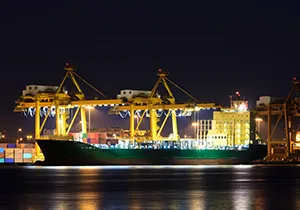In the wake of the recent Baltimore bridge collapse caused by a cargo ship accident, the vulnerability of global supply chains has never been more evident. This incident, resulting in significant disruptions, underscores the critical need for businesses to have robust strategies in place for navigating through emergency supply chain disruptions. At American Warehouse, Inc., we understand the complexities and challenges that sudden logistical hurdles present. Our aim with this guide is to offer actionable advice on how businesses can mitigate the impact of such disruptions, ensuring resilience and continuity in operations.
Understanding the Impact of Supply Chain Disruptions
Supply chain disruptions, whether caused by natural disasters, geopolitical tensions, or accidents like the recent cargo ship collision, can have far-reaching consequences. They can halt production, inflate costs, and delay deliveries, affecting customer satisfaction and business reputations. The first step in mitigating these impacts is understanding the potential risks specific to your supply chain and preparing accordingly.
Strategies for Mitigating Supply Chain Disruptions
In response to unexpected disruptions, businesses can employ several strategies to ensure their supply chain remains resilient.
Diversifying Logistics Options: Relying on a single logistics provider or route can leave your supply chain vulnerable. Diversification, whether through multiple transportation modes or alternative supply sources, can provide the flexibility needed to respond to unforeseen events.
- Emergency Response Plans: Having a well-documented and easily accessible emergency response plan is crucial. This plan should outline procedures for various disruption scenarios, assign responsibilities, and detail communication strategies.
- Leveraging Technology: Advanced tracking and management systems offer real-time visibility into your supply chain, enabling quicker response to disruptions. Technologies like IoT and AI can also predict potential bottlenecks and suggest alternative solutions.
- Building Strong Relationships: Collaborating closely with suppliers, logistics providers, and customers ensures that everyone is on the same page when disruptions occur. Strong relationships can lead to more cooperative and flexible arrangements in times of need.
Creating a Culture of Resilience
Beyond strategies and technologies, fostering a culture of resilience within your organization is fundamental. Encourage proactive thinking, regular training on emergency procedures, and a mindset of continuous improvement. Teams that are adaptable and informed can make all the difference in navigating through crises successfully.
Leveraging Partnerships for Enhanced Flexibility
A key component of a resilient supply chain is the strength of its partnerships. In times of crisis, having a reliable network of partners becomes indispensable. At American Warehouse, Inc., we pride ourselves on the strength and reliability of our partnerships across the supply chain spectrum. Our collaboration with clients, suppliers, and logistics providers is built on transparency, mutual trust, and shared objectives. This network not only ensures the smooth operation of day-to-day logistics but also provides a robust support system during emergencies.
Benefits of Strong Partnerships:
- Enhanced Communication: Clear and open communication channels with partners ensure that any potential disruption can be quickly identified and addressed.
- Shared Resources: Access to a broader range of resources, including alternative transportation modes and routes, can help mitigate the effects of disruptions.
- Joint Problem-Solving: Working closely with partners allows for pooling expertise and resources to find innovative solutions to complex challenges.
Continuously Improving and Learning
The landscape of global logistics is ever-changing, and what works today may not suffice tomorrow. Continuous improvement, driven by lessons learned from past disruptions, is essential. At American Warehouse, Inc., we are committed to not just adapting to changes but anticipating them. Through regular reviews of our processes, technologies, and partnerships, we ensure that our strategies are not only current but also forward-thinking.
Key Areas for Continuous Improvement:
- Data Analysis: Regularly analyzing supply chain data to identify patterns, trends, and potential vulnerabilities.
- Technology Updates: Keeping abreast of the latest in logistics and supply chain technologies to enhance efficiency and responsiveness.
- Training and Development: Ensuring that our team and partners are well-trained and knowledgeable about the latest in supply chain management and emergency response.
How American Warehouse, Inc. Can Help
At American Warehouse, Inc., we’re not just a warehousing and logistics provider; we’re your partner in building a more resilient supply chain. Our diverse logistics solutions, advanced tracking technologies, and expert team are here to support your business through unforeseen challenges, just like the recent cargo ship and bridge accident.
Incorporating these strategies into your supply chain management can significantly mitigate the risks associated with sudden disruptions. By diversifying logistics options, leveraging technology, establishing emergency response plans, and fostering a culture of resilience, businesses can navigate these challenges more effectively.
Your Partner in Building a Resilient Supply Chain
The recent cargo ship and bridge accident is a stark reminder of the unpredictable nature of supply chain disruptions. However, with the right strategies, technologies, and partnerships, businesses can navigate these challenges successfully. At American Warehouse, Inc., we are dedicated to providing our clients with the tools, knowledge, and support needed to build a resilient supply chain.
If your business is looking to enhance its supply chain resilience, contact us today. Let’s work together to develop a tailored logistics solution that not only meets your current needs but also prepares you for future challenges. Together, we can turn disruptions into opportunities for growth and innovation.

